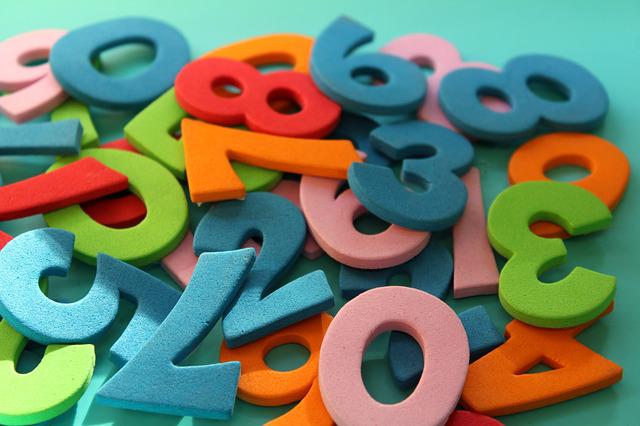Math Talk, It’s as Easy as 1…2…3!

When we think about learning math in our early school years, we often think about addition, subtraction, multiplication, and/or division sitting in our elementary school desks. Worksheets, memorizing the multiplication table and trying to decide which train got to a certain destination faster also come to mind as we reminisce on our early math days.
So it’s no wonder that we try to get our preschool children ready for math by trying to teach them mathematical concepts early on; we want to prepare them, but we often do not know how. Some argue that young children do not like math or that they may not be ready to learn complex skills such as early geometry or basic multiplication. However, there has been an abundant amount of research (National Research Council 2001; Clements & Sarama 2014; Carpenter et al. 2016) that shows young children actually enjoy learning about math and can learn far more than what was previously assumed (without a single flash card or worksheet)!
Young children are aware of mathematical concepts that are relevant to their world such as their age, who had a toy first, who is first in line, or who is faster, taller, or shorter. Yet, they may not have the knowledge or vocabulary to connect what they know to mathematical concepts. This is where you, the teacher, come in: to help children develop those mathematical connections.
One of the first things teachers can do to help develop these concepts in children is to provide mathematical materials within the classroom for daily use. Teachers should provide materials that promote counting, measuring, sorting, sequencing/ patterning, comparing quantities and sizes, recognizing shapes and patterns, becoming familiar with written numbers, and even understanding time. Using the environmental rating scales as a guide, teachers can use these tools to take an inventory of which materials they already have within their classrooms and which ones they need to add to enhance children’s mathematical skills.
Helping children build a solid mathematical foundation early on is essential to their future success in school as well as their everyday life. It is important that we as teachers give our children daily opportunities to solve mathematical problems, vocabulary, reasoning, and make mathematical connections throughout their days with us.
Based on the work of Cindy Gennarelli and Mary DeBlasio (2017), here are some ways teachers can expand children’s mathematical thinking and learning throughout their preschool day:
- Have children try to identify, name, count, repeat, or recall math concepts while using classroom materials during play. For example, ask the children “How many people live in your house?”, “What is this shape called?”
- Have children discuss or describe their work to you. i.e. “Tell me about the pattern you made with the beads on your string.” or “Explain how you will figure out how many children are here today”
- Have children apply what they learned through play or song. For example, have children use stick or finger puppets to sing and act out “5 Little Monkeys” or other similar songs with numbers.
- Have the children express their opinion on solving a certain mathematical problem. For example, “using the balance scale, what would you need to add to each side to make the balance level?” or “what could we use to measure how big our block building is?”
H&H Child Care Training Center (ChildCareEd) can help Georgia’s early childhood teachers build their knowledge on teaching math skills to young children with such courses as No Such Thing as Boring Math.
All our online courses provide text, voice, and videos to make the content engaging as well as informative and are Bright from the Start approved for clock hours! Search the GaPDS website under our Approved Sponsor Organization code (TR-ASO-76) for a full list of all our courses!
Visit our website to see a full list of classes on how to support the children in your classroom today!
- Pediatric RSV First Aid & CPR/AED
- Asthma, Allergy and Anaphylaxis Prevention and Management Training for Early Education Providers
- 45 Hour Child Growth and Development
- 45 hour Growth and Development Birth-age 12 ONLINE
- Developing Program Tranquility
- Technology as a Classroom Tool
- Texas Director Credential
- CDA Preschool Credential with Portfolio Review
- CDA Infant/Toddler Credential with Portfolio Review
- How Does the Americans with Disability Act ( ADA) apply to child care centers
- Early Childhood Education
- Conflict Resolution Skills You Can Teach in Under 2 Minutes
- The Lead Teacher Leap: How a CDA Unlocks Higher Pay and More Responsibility.
- March Madness in Child Care: Simple Activities for Big Energy Days
- Texas Rising Star: Staff Training Plans, Documentation Tips, and PD Ideas for Directors
- Can activity posts about learning through play attract families and support children’s learning?
- Texas Preschool Lesson Planning: Simple Daily Schedules That Work
- How can providers and parents communicate so children thrive?
- What easy sensory bin themes can I make with household items?
- What should parents include on a kindergarten readiness checklist?
- Emotions for Kids: Fun Activities to Teach Feelings and Self-Control
- Eid al-Fitr Classroom Activities: Easy Ideas for Child Care and Preschool
- Irish American Heritage Month Activities for Preschool and Daycare
- How can I manage challenging behaviors with confidence and care?
- From Mount Sinai to Story Time: Shavuot Ideas for Kids
- Stars & Stripes Celebration: Independence Day Classroom Activities